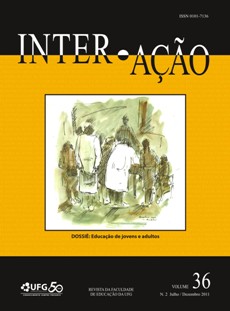GESTÃO PEDAGÓGICA DE CURSOS DE LICENCIATURA EM UMA UNIVERSIDADE PÚBLICA: CONTRIBUIÇÕES PARA UMA REFLEXÃO
DOI :
https://doi.org/10.5216/ia.v36i2.16723Mots-clés :
Gestão Pedagógica na Educação Superior, Coordenação de Cursos de Graduação, Currículo, Formação de ProfessoresRésumé
Este trabalho apresenta reflexões acerca de experiências na coordenação de cursos de graduação de formação de professores no contexto de uma universidade pública brasileira, enfocando elementos facilitadores e elementos limitantes de construção de um processo coletivo, tendo os projetos pedagógicos dos cursos como instrumentos de gestão. Entre os elementos facilitadores são apontados e analisados alguns dispositivos legais e cursos de formação docente, promovidos pela universidade, que enfocam o tema da gestão. Quanto aos limites, são mencionados, dentre outros, dificuldades de construção do trabalho coletivo, sobrecarga de trabalho dos docentes, condições de ofertas dos cursos de graduação, valorização e prioridade da pesquisa em detrimento do ensino.Téléchargements
Téléchargements
Publié-e
Comment citer
Numéro
Rubrique
Licence
A Inter-Ação utiliza como base para transferência de direitos a licença Creative Commons Attribution 4.0 para periódicos de acesso aberto (Open Archives Iniciative - OAI). Por acesso aberto entende-se a disponibilização gratuita na Internet, para que os usuários possam ler, baixar, copiar, distribuir, imprimir, pesquisar ou referenciar o texto integral dos documentos, processá-los para indexação, utilizá-los como dados de entrada de programas para softwares, ou usá-los para qualquer outro propósito legal, sem barreira financeira, legal ou técnica.
Autores que publicam neste periódico concordam com os seguintes termos:
1) Autores mantém os direitos autorais e concedem à revista o direito de primeira publicação, com o trabalho simultaneamente licenciado sob a Licença Creative Commons Attribution que permite o compartilhamento do trabalho com reconhecimento da autoria e publicação inicial nesta revista.
2) Autores têm autorização para assumir contratos adicionais separadamente, para distribuição não-exclusiva da versão do trabalho publicada nesta revista (ex.: publicar em repositório institucional ou como capítulo de livro), com reconhecimento de autoria e publicação inicial nesta revista.
3) Autores têm permissão e são estimulados a publicar e distribuir seu trabalho online (ex.: em repositórios institucionais ou na sua página pessoal) a qualquer ponto antes ou durante o processo editorial, já que isso pode gerar alterações produtivas, bem como aumentar o impacto e a citação do trabalho publicado.















